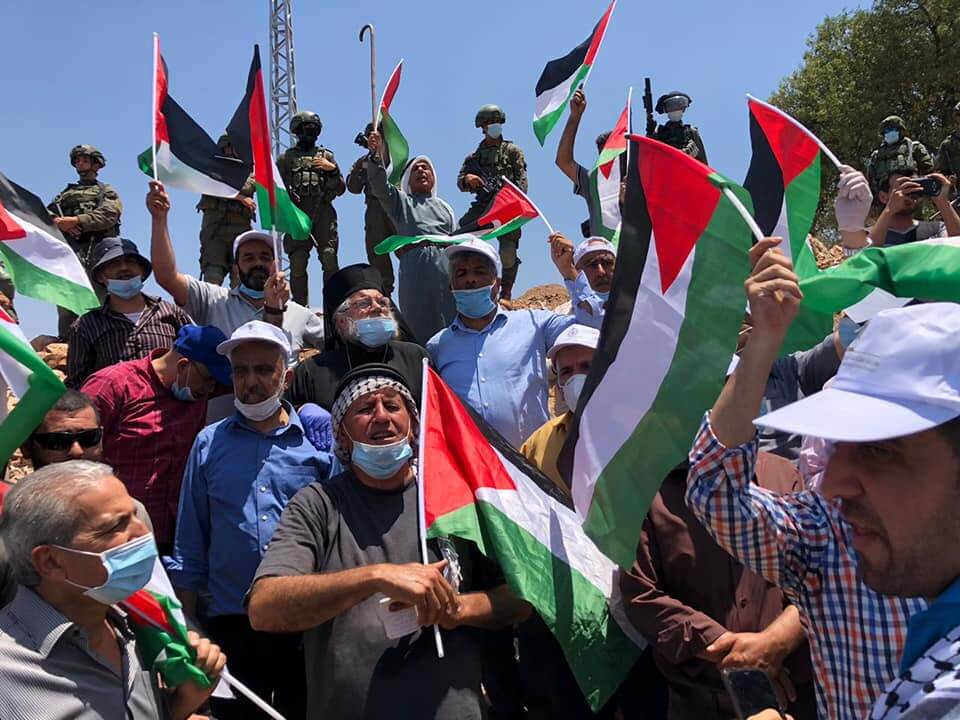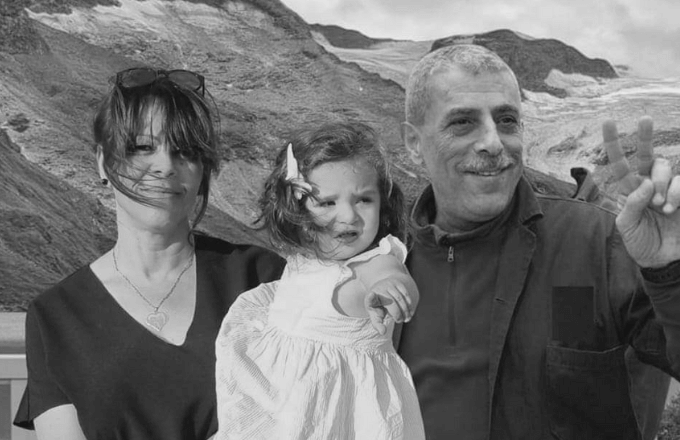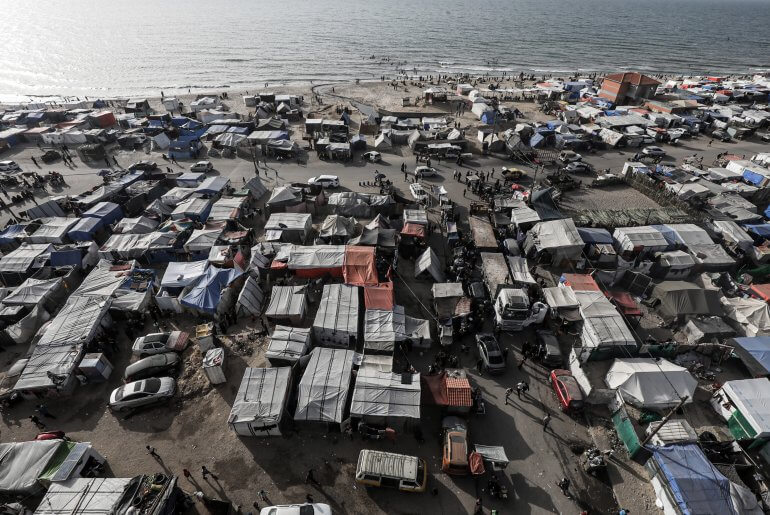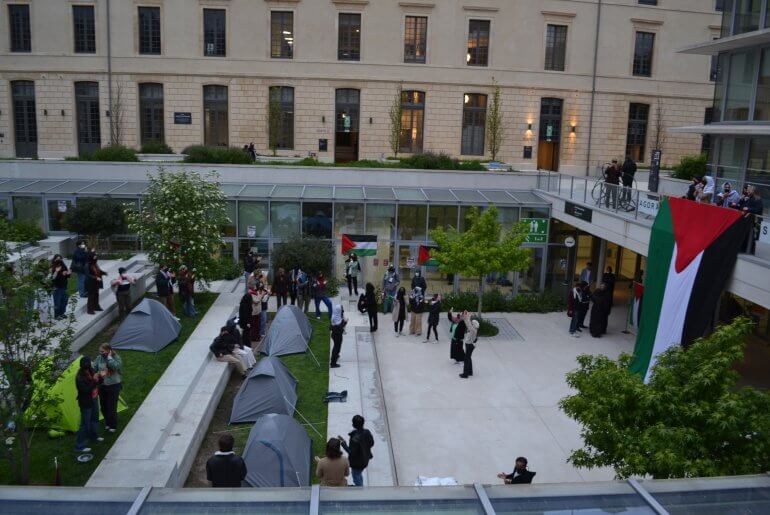It has been one month since Israel’s unofficial July 1st deadline to annex the West Bank passed.
The media attention leading up to the date reached a fevered pitch by June 30th, as international condemnations rolled in, and US congress members began floating the idea of conditioning aid to Israel.
By the time July 1st rolled around, after weeks of intense build up, Israel had begun to backtrack, and eventually, talk of annexation seemed to fizzle out.
But while the world may have moved on from annexation, for the time being, the consequences of Israel’s promises are being felt on the ground in the West Bank, as reports of settler attacks on Palestinians and their property surged in July, as well as in June in the lead up to annexation.
Almost every day since July 1st has seen reports of settler attacks and incursions on Palestinian towns and villages across the West Bank.
Notably, a significant portion of the recorded incidents relate to settlers attempting to seize new pieces of land or establish new outposts in the West Bank.
According to data gathered by Mondoweiss from local Palestinian news reports, from July 1st to the 31st, there have been at least 25 reported incidents of Israeli settlers attempting to seize Palestinian land, setting up new outposts, attacking Palestinians, vandalizing Palestinian homes, mosques, and vehicles, and burning down Palestinian crops and agricultural lands.
Between June 30th and July 13th, the UN Office for the Coordination of Humanitarian Affairs (OCHA) documented the injury of at least five Palestinians from settler attacks — including three Palestinians who were shot with live ammunition, one who was physically assaulted, and another who was bitten by a dog unleashed by settlers. From the 14th to the 27th of July, UN OCHA confirmed nine more attacks.
The attacks have taken place across the territory, from Hebron to Jenin, though typically in rural Palestinian towns and villages that are located in close proximity to settlements.
Out of the 25 incidents, at least 14 occurred in the Nablus district of the northern West Bank, a hotspot for settler violence year round.
On top of settler attacks and incursions, data indicated that within the same time period on at least four occasions, the Israeli military engaged in the confiscation or destruction of Palestinian land.
In three out of four of the incidents, the land seized by Israeli forces was in close proximity to an illegal settlement or outpost, leading to speculation that Israeli authorities were confiscating land for future settlement expansion — a well-documented phenomenon in the occupied territory.
At least three major attempts to seize land and set up new outposts were also recorded in the days leading up to, and after July 1st — one in the Nablus-area village of Asira al-Shamaliya, one in the Hebron-area town of Halhul, and one in the Bethlehem-area village of Battir.
In the cases of Asira al-Shamaliya and Halhul, the settlers attempted to seize land that, according to residents, had not witnessed any confiscation attempts for several years, exacerbating fears that settlers were feeling particularly emboldened by the promises of annexation.
Halhul – First came the military, then came the settlers
The town of Halhul is one of the largest in the Hebron district, and the entire West Bank, with sprawling hilltops that date back thousands of years. Distinct in Halhul is “Mount Jumjumah”, as its known by locals, and is said to be one of the highest points in the area, over 1,000 meters above sea level.
On June 30th, one day before Israel’s annexation day, locals in the town spotted a large group of Israeli settlers, escorted by military jeeps, on top of the mountain. When a group of Halhul’s residents went up to the mountain to see what was going on, they were told by Israeli soldiers to leave.
“The soldiers told us that the settlers would only be there for a few hours to do some religious things, and then they would leave,” Hijazi Mereb, 63, the mayor of Halhul told Mondoweiss.
A few days later, however, Mereb and his neighbors were shocked to find the settlers back, this time with over a dozen tents and Israeli flags.
“We don’t want them to come to our land at all. Not for religious reasons, because as you see, eventually they come back and try to take it for themselves,” Mereb said.
After hundreds of locals gathered to dispute the presence of the settlers, Mereb says the settlers were escorted off the land by the soldiers. “But we think they’ll be back.”
The plot of land where the settlers began to set up camp is located just a few hundred meters away from an Israeli military outpost, built back in the 1980s during the First Intifada. When the outpost was established, the military confiscated at least two dunams of surrounding farmland and have since prevented Halhul’s residents from accessing the land.
“For years they have kept us off the mountain, especially the area close to the military base, saying it is for ‘security reasons’,” Mereb said. “But when the settlers want to come here, the military escorts them and protects them.”
Mereb says that the recent attempts to take over Mount Jumjumah are not the first. “For decades, since the Israeli occupation of the West Bank in 1967, the Israelis have set their sights on this mountain.”
He pointed out that more often than not, the Israeli military will confiscate large swaths of Palestinian land, and eventually the land will be turned over to the settlers.
“They have been trying to seize this mountain forever,” he said, adding that it has been a while since the last attempt. “But now with the annexation, it has given the settlers a push to keep attempting to steal the land, and they’ve gotten a greenlight from their government to do so.”
“The settlers aren’t just interested in Halhul. They are interested in all the Palestinian land, and won’t stop until they take it over,” Mereb said. “Today it was Hebron, yesterday it was the Jordan Valley, and tomorrow it will be Nablus and the other villages.”
Battir – ‘This is how it starts’
For many Palestinians the village of Battir, south of Bethlehem City, is an anomaly. Its beautiful lush green hills, ancient terraces, and shared border with Jerusalem, make it an ideal location for Israeli settlers in the West Bank.
For decades, the residents of Battir have managed to keep their land free of settlements. Many locals attribute their success to their painstaking attempts to get Battir recognized as a UNESCO World Heritage Site, which they successfully managed to do in 2014.

“Being granted that status was a huge achievement for us,” Hassan Muamer, 35, a local activist in the village, who lobbied heavily for the UNESCO distinction, told Mondoweiss. “We thought somehow, that being a UNESCO site, would protect us from the Israeli occupation.”
For the past two years, the status of Battir as a settlement-free village has been confronted head on, when a group of over 100 Israeli settlers first attempted to take over a mountain top in the eastern part of the village on Christmas Eve in 2018 and establish a new outpost.
Muamer and his fellow villagers managed to pressure the settlers off Battir’s land at the time. But six months later, just two kilometers away in the al-Makhrour valley, the same group of settlers set up a new illegal outpost called Neve Ori on the lands of Beit Jala.

In early July, the settlers from Neve Ori were spotted back in the same location in Battir that they tried to take over almost two years ago.
“We first noticed them coming almost every day, riding around with their ATV’s, and bringing their sheep to graze in our olive groves,” Muamer said, adding that the settlers harassed local farmers on several occasions.
But on July 6th, the presence of the settlers became even more threatening, when residents of Battir noticed that the settlers had brought a large tent and water tanks with them.
“They said that they wanted to set up an agricultural tent in the area so they can come from their outpost in Makhrour and bring their livestock to graze here,” Muamer said, noting that the land connecting Beit Jala with Battir is a contiguous valley with paved pathways, making it easy for the settlers to travel between the two.
Muamer and his fellow residents immediately called the Israeli police, notifying them that there were “thieves” on their land. When the police and military arrived, they told Battir’s residents that the settlers would only be grazing there until 5:00 p.m., and would leave at that time.
The settlers, and eventually the soldiers did leave. But the next day, they were back in the same location, and the residents were told the same thing.
“Almost every day since then, the settlers have been coming under the protection of the soldiers to graze their sheep here, and provoke the farmers in the area,” Muamer said.
Around the end of July, Muamer said, the settlers started coming at night. “They started making fires, hanging out in the area, and going swimming in one of the farmer’s reservoirs.”
“They act as if this is normal, as if it is their land and they have a right to be here,” Muamer said.
According to Muamer’s testimony, and reports from Israeli media, the settlers are justifying their takeover of Battir’s land using a 1982 order that declared a substantial portion of the land in the area as “state land.”
“We, the residents of Battir were never made aware of the decision back in 1982. We only came to know of this confiscation when these settlers started throwing it in our face, telling us they had the right to be here,” Muamer said.
+972 Magazine interviewed Lior Tal, the settler leader who established Neve Ori, and has been leading the effort to take over Battir’s lands. When questioned about why he was attempting such a takeover, he said “the Palestinians stole the land from me.”
“I want all of Battir to go to hell…the State of Israel belongs to the Jewish people,” Tal told +972, adding that “I have no problem with [Palestinians] staying if they agree to the Seven Laws of Noah [a set of prohibitions that Orthodox Jews believe are binding for everyone] or if they want to convert.”
Muamer and his fellow residents say they know what they’re up against. “These settlers are not just religious fanatics and nationalists, they are the prime example of Israel’s settler colonial enterprise,” he said.
“These settlers are armed, they have Zionist organizations like the Jewish National Fund (JNF) funding their efforts, and they have the state backing them and protecting them throughout the entire process,” he said.
“To the people outside of Palestine, they might see these events as minor and insignificant,” Muamer said. “But we know that this is how it starts. The settlers make their presence known on the land, then they establish an outpost, and inevitably, they displace more Palestinians.”
Asira al-Shamaliya – Settler attacks breathe new life into village resistance
The village of Asira al-Shamaliya is a quiet place, north of Nablus in the northern occupied West Bank, known across Palestine for its exquisite olive oil, one of the main exports of the village.

In a district rife with violent attacks from extremist Israeli settlers, Asira al-Shamaliya has managed to stay free of settler violence for decades. The last attempt by settlers to attack the village or takeover land in the area was back in the First Intifada.
On June 26th, just four days before the deadline for annexation, locals noticed a group of armed Israeli settlers had set up a caravan and animal shed on the outskirts of the village. Protecting the settlers were a group of Israeli soldiers, who were stationed at a permanent military outpost just a few hundred meters away.
The people of Asira al-Shamaliya were suddenly confronted with an issue they had never dealt with before.
“We knew that we had to get the settlers off the land,” Hazem Yassin, 45, the mayor of Asira al-Shamaliya told Mondoweiss. “They immediately cordoned off at least two dunams of land around the new outpost, so it was only a matter of time before they took more.”

Yassin knew that he couldn’t risk the confiscation of the village’s land, specifically on the mountain where the settlers had set up camp. “That area is filled with olive groves and privately owned land,” he said, adding that his family owned land in the area.
The mountaintop where the settlers are located is the biblical Mount Ebal, or “Jabal Aybal” in Arabic. It’s the highest mountain in the northern West Bank that overlooks the city of Nablus, and is an extremely strategic location.
“It’s no surprise they chose this location, and that they came right around the time of annexation,” Yassin said.
“If we were to lose this land, it would devastate our people and our olive production,” he said.
So, Yassin and his fellow activists decided to organize a protest against the confiscation of the land. Their first demonstration was met with violent force by dozens of Israeli soldiers, who fired tear gas and rubber-coated steel bullets at protesters, injuring at least three people.

The tear gas caused a large portion of the hilltop to catch on fire, burning crops and olive trees that were decades old.
On July 7th, Israeli bulldozers came and built a large dirt mound along the main path connecting Asira al-Shamaliya to the site of the outpost, preventing local farmers from accessing the mountaintop.

Despite the setback, the villagers organized another protest, which was again met with violent force. The protests, which consist of hundreds of locals and activists from around the West Bank waving Palestinian flags, have continued every Friday since June 26th.
Yassin was even injured during one of the protests, when a tear gas canister hit him in the face, forcing him to be hospitalized.
But he vowed that the protests would continue until the settlers were gone. “It doesn’t matter who gave the settlers permission, whether it’s Netanyahu or Trump,” he said. “This is our land, we are the ones who get to decide. And we do not want the settlers here — not now, not ever.”






Here’s an observation: for some time I’ve noticed that if the article is about Israelis kicking the **** out of Palestinians there’s very little, if any, hasbara – here we have a story about how the settlers committing human rights violations and there’s no attempt at justifying the situation. But when it comes to goofy questions about Jewish “identity” or how Israel is the ancient homeland of the Jews, or some fine point of U.N. resolution 15678893-a, the graduates of Hasbara U all over it.
The article above further confirms that Zionism is racist and fascistic!
Josef Weitz, founder of the Jewish Agency’s Transfer Committee: “…there is no room for both people together in this country….The only solution is a Palestine…without Arabs. And there is no way other than to transfer the Arabs from here to the neighbouring countries, to transfer all of them; not one village, not one tribe, should be left.” (Yosef Weitz, My Diary and Letters to the Children, 1965.)
https://al-awda.org/on-israels-little-known-concentration-and-labor-camps-in-1948-1955 – “On Israel’s little-known concentration and labor camps 1948-1955”
Jan. 19, 2018 – Haaretz
Opinion: “In Israel, Growing Fascism & a Racism Akin to Early Nazism” by Zeev Sternhell.**
EXCERPT:
“I frequently ask myself how a historian in 50 or 100 years will interpret our period. When, he will ask, did people in Israel start to realize that the state…had devolved into a true monstrosity for its non-Jewish inhabitants. When did some Israelis understand that their cruelty and ability to bully others, Palestinians or Africans, began eroding the moral legitimacy of their existence as a sovereign entity?”
**The late Zeev Sternhell was one of the world’s leading experts on fascism. He headed the Department of Political Science at the Hebrew University of Jerusalem.
And fascists love to hang out with other fascists:
“Netanyahu to travel to Brazil for inauguration of Jair Bolsonaro” https://www1.folha.uol.com.br/mundo/2018/10/netanyahu-planeja-comparecer-a-posse-de-bolsonaro.shtml
Yeah, jon s we know that “Israel offered humanitarian aid”.
Here you go:
“Israel, destroyer of Lebanon, poses as its savior
Even amidst catastrophe, Israel’s hypocrisy knows no bounds.
A massive explosion rocked Beirut on Tuesday, killing at least 135 people, injuring more than 5,000 and displacing hundreds of thousands.
The death toll is likely to climb as rescue workers search the devastated Lebanese capital.
The blast left little unscathed, as citizens posted pictures and videos of shattered homes, damaged cars and collapsed buildings across the city.
The cause of the explosion remains under investigation. Lebanese officials linked it to 2,750 tons of ammonium nitrate stored for the past six years in warehouses at the port without safety precautions.
Now, Israel is exploiting the tragedy to erase its own crimes against Lebanon, distract from military occupation and polish its image – a propaganda strategy called bluewashing…”
Lots more for you and your students to absorb right here @- https://electronicintifada.net/blogs/tamara-nassar/israel-destroyer-lebanon-poses-its-savior, including Feiglin’s ‘kind wishes’ that Ossinev shared above.
The truth is so very refreshing.